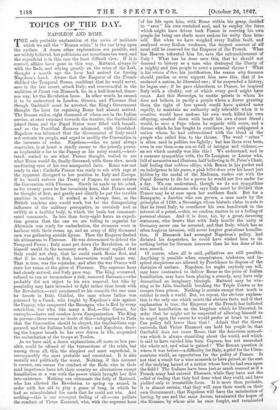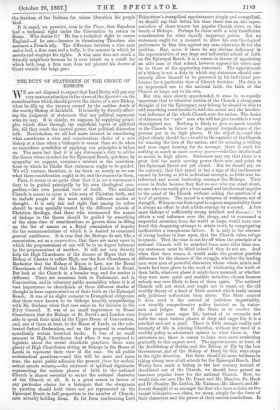TOPICS OF THE DAY.
NAPOLEON AND ROME. THE only probable explanation of the series ,of incidents which we call the "Roman crisis," is the one lying upon the surface. A dozen other explanations are possible, and are widely believed, but politicians are sometimes too wary, and the superficial is in this case the least difficult view. If it is correct, affairs have gone in this way. Rattazzi, always lie' with the Reds, and relying greatly on the votes of the Left, thought a month ago the hour had arrived for forcing Napoleon's hand. Aware that the Emperor of the French disliked the Temporal Power, confident that he would never, save in the last resort, attack Italy, and over-trustful in the ambition of Count von Bismarck, he, in a half-hearted, timor- ous way, let the Revolution loose. In other words, he caused it to be understood in London, Geneva, and Florence that though Garibaldi must be arrested, the King's Government thought the hour for regaining Rome had almost arrived. The Roman exiles, eight thousand of whom are in the Italian service, at once swarmed towards the frontier, the Garibaldini joined them, and the Papal States were filled with tumult, and as the Pontifical Zouaves advanced, with bloodshed. Napoleon was informed that the Government of Italy could not restrain its people, and urged to modify the Convention in the interests of order. Napoleon—who, we must always remember, is at heart a deadly enemy to the priestly power, as implacable a foe to the Papacy as his noisy cousin,—hesi- fated, waited to see what France thought, waited to see what Rome would do, finally discerned, with those slow, much meditating eyes of his two unexpected facts. Rome was not ready to rise ; Catholic France was ready to sob with rage at the apparent disregard to her position in Italy and Europe. If be would enforce the Treaty of Prague, he must enforce the Convention with Florence. Slowly he made up his mind, as for twenty years he has invariably done, that France must be thought of first, and gently and silently he put the terrible machine in motion. It worked as it always does, as the British machine also would work, but for the disorganizing influence of the military prerogative, as certainly and as swiftly as a healthy body, to which the brain has communi- cated commands. In less than forty-eight hours an expedi- tion greater than the one we are toiling to organize for Abyssinia was ready for embarkation, the steamers were in harbour with their steam up, and an army of fifty thousand men was gathering outside Lyons. Then the Emperor flashed his ultimatum to Florence. He was determined to defend the Temporal Power ; Italy must put down the Revolution, or he himself would do the necessary work. Rattazzi replied that Italy could not obey, that he could reach Rome first, and that if he reached it first, intervention would mean war. That is true, was the rejoinder, and after the war France will state her terms at the gates of Florence. The supreme hour had clearly arrived, and Italy gave way. The King, overawed, refused to run so tremendous a risk, removed Rattazzi,—who probably did not object to his own removal, but who by possibility may have intended to fight rather than break with the Revolution,—and summoned to his councils the one man he dreads in Italy, Cialdini, the man whose father was poisoned by a Court, who fought by Napoleon's side against the Papacy, who conquered the Romagna, who is Red by every conviction, but who, like many a Red,— like Carnot, for example,—hates and crushes down disorganization. The King in person—there seems no doubt of this—telegraphed to Paris that the Convention should be obeyed, the Garibaldians sup- pressed, and the Italians held in check ; and Napoleon, draw- ing the longest breath he has ever drawn in life, suspended the embarkation of the troops at Toulon.
As we have said, a dozen explanations, all more or less pos- sible, could be offered of the transactions of the crisis, but among them all, this, the simplest and most superficial, is incomparably the most probable and consistent. It is also morally and politically the worst. Nothing, if this account is correct, can excuse the conduct of the Reds, who in their mad impatience have left their country no alternatives except humiliation or a war with the power which brought her first into existence. Nothing can extenuate the folly of Rattazzi, who has allowed the Revolution to spring up armed, in order with her aid to play a game of brag, in which he had so miscalculated his cards that he could not win. And nothing—this is our strongest feeling of all—can palliate the conduct of Victor Emanuel, who, with the supreme hour of his life upon him, with Rome within his grasp, decided: to " save " his own wretched soul, and to employ the force which might have driven back France. in coercing his own- people for being one shade more zealous for unity than him- self. But when we have weighed every Italian fault, and analyzed every Italian weakness, the deepest censure of al?
must still be reserved for the Emperor of the French. What has Heaven tolerated him for, save the enfranchisement of' Italy What has he done save this, that he should not descend to history as a man who destroyed the liberty of a mighty and free people to erect a personal throne ? ' What is his raison cntre, his justification, the reason why freemen- should pardon or even support him save this, that if he enslaved a nation, he liberated one ; if he suspended a history, he began one ; if he gave chloroform to France, he inspired: Italy with a vitality, out of which every good might have come. And this Sovereign, to soothe priests in whom he does not believe, to pacify a people whom a decree granting. them the right of free speech would have quieted more to maintain an authority only tolerable when it is creative, would have undone his own work, killed his own, offspring, crushed down with insult his own closest friend;.
would, to save a Pope whom he regards with scorn, and a. throne which he has fought to overthrow, have subjugated a. nation whom he had enfranchised with the blood of the, people who called him to the throne. The word " crime " is often used in politics too lightly ; but has there ever been,. even in our time,—an era so full of intrigue and violence,— an act which morally was like this ? We understand, and in.. a measure sympathize with, the De Lusignan or Lussac who, full of memories and illusions, half believing in St. Peter's Chair, half feeling that noblesse oblige, with Renan in his pocket and an indulgence in his purse, a pink billet dour over his heart just hidden by the medal of the Madonna, rushes out with the- Papal Zouaves to die for a power he would not live under for a day. We can understand, though we do not sympathize- with, the cold statesman who says Italy must be divided that. Francemay be at ease upon her southern flank. But for a Bonaparte, a Jacobin who can govern, a man made by the principles of 1789, a Sovereign whose historic claim to rule is• that he freed Italy, to overthrow his own handiwork in the- interest of a priest,—this, we confess, excites in us a feeling of personal shame. And it is done, too, by a great, farseeing statesman, who knows that with Italy hostile the unity of Germany never can be arrested, and that Italy, which has so, often forgiven invasion, will never forgive gratuitous humilia- tion. If Bismarck had arranged Napoleon's policy, had dictated his despatches, he could have wished him to do. nothing better for German interests than he has done of his. own accord.
Of course, when all is said, palliatives are still possible.. Anything is possible when conspirators, tricksters, and in-- spired simpletons are allowed by Providence to dispose of the. destinies of nations. Napoleon, for aught anybody can tell,. may have contracted to deliver Rome as the price of Italian humiliation, may have been playing a comedy, may have only dramatized an imaginary triumph. Rattazzi may be win- ning as he falls, Garibaldi breaking the Triple Crown as he escapes from prison. Nothing is certain except that truth is. extinct in such a world. But, we repeat, the obvious explana- tion is the only one which meets the obvious facts, and if that explanation is true, the Emperor of the French has inflicted the last humiliation on the kingdom which he liberated, in order that he might not be suspected of allowing himself to,- be urged upon the course he would prefer at heart to tread. Can policy fall lower than that ? Admit that the threat succeeds, that Victor Emanuel can hold his people in, that Garibaldi does not rouse Rome, that the American man-of-- war which is always stumbling about the world, and which is said to have carried him from Caprera, has not unmeshed the whole net, and what is gained ? The Roman question is where it was before—a difficulty for Italy, a grief for the Ultra– montane world, an opprobrium for the policy of France. Is not that a result for a wise monarch to have gained, at the cost. of the undying hatred of a nation whose love he had won upon. the field The Italians have been just as much coerced as if a -French army had entered Florence, while they have not the relief of feeling that they had done what they could, and have yielded only to irresistible force. It is more than probable, it is almost certain, that they will turn their wrath on their own Government; that Napoleon will have the satisfaction of having, by one and the same decree, terminated the hopes of the Romans, by whose side he once fought, and terminated the freedom of the Italians, for whose liberation his people bled.
It is urged, we perceive, even in the Times, that Napoleon 'had a technical right under the Convention to return to 'Rome. 'Who denies it? He has a technical right to coerce England—if he can—because in threatening Theodore she menaces a French ally. The difference between a wise man and a fool, a firm man and a bully, is the manner in which he asserts and employs his rights. A wise man 'does not crush a friendly neighbour because he is over intent on a result for which both long, a firm man does not placard his decree of Court outside the lodge gate.



































 Previous page
Previous page